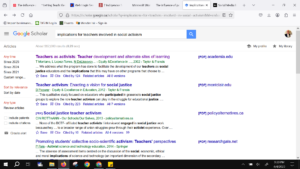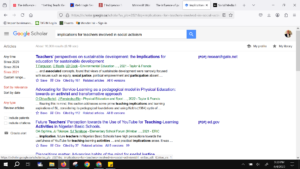This week’s discussion in class was a bit uncomfortable for me. I am definitely more of a lurker in social media spaces and I don’t have any experience with online social activism. The only social media I use regularly is Facebook so I decided to check what I have posted in the past 4 years. The closest thing to activism that I can find is when I posted a link to an article in January of 2020 about the effects of Screen Time use in children. I found it ironic that I posted that just 2 months before COVID!
When I look at my social media posts with the question “What does your online presence say about you?” in my mind, I have pieced together the following:
- Mom of 2 kids
- Wife to an avid bbq lover
- Christian
- Librarian
- Teacher
I managed to find one “political” post. On October 19, 2015, I posted “I voted today – did you?” Wow! I feel so rebellious!
I am generally wary of showing my political, religious or personal views online because of the stories I have heard about teachers losing their jobs or being disciplined because of their online content. Here are a few links in case you are interested:
Massachusetts Teacher Fired for TikTok videos from Boston
Teacher Discharged for Social Media Posts from Pennsylvania
Teacher guilty of misconduct over anti-COVID social media posts from Ontario
The Merits of Being Antisocial from the Alberta Teachers Foundation
So, with that background in mind, I started to look for some peer reviewed research about teacher social activism. I used the search “Implications for teachers involved in social activism” in Google Scholar and on the UofR Archer Library page.

Interestingly, most of the research was very positive before 2021. The articles talk about the importance of introducing social justice to students and getting students to use social media in school. All of these articles were written 10+ years ago.
I then refined my search to limit the results to “since 2021”.
 As you can see, the results are very different. I have my own ideas about why the research changed but I would love to hear your thoughts in the comments about possible reasons the research has changed so significantly in the past 5 years.
As you can see, the results are very different. I have my own ideas about why the research changed but I would love to hear your thoughts in the comments about possible reasons the research has changed so significantly in the past 5 years.
Going down a different type of rabbit hole this week, I found some really inspiring examples of how social media activism has made a positive impact.
I found a fascinating book online through JStor called Indigenous Peoples Rise Up: The Global Ascendency of Social Media Activism. I read Chapter 7 called Indigenous Activism Using Twitter. I chose this chapter because it specifically focuses on the Canadian perspective of MMIWG. The chapter looks at how MMIWG information was reported (or not) by mainstream media before, during and after the 2019 release of the National Inquiry report. It also highlights how Indigenous people have been able to come together through shared experiences using hashtags related to Indigenous issues. A quote that stood out to me in the chapter was this:
“Social media can help to create a unified space where activists are supported in solidarity by a network of individuals who may be affiliated only through social media but mobilize together toward a common political goal (see Berglund, this volume; Vigil-Hayes et al., 2017)” (p. 119).
Another group of people who have found solidarity and community through social media activism are people with disabilities. For them, it is “not about performance, it is about access” (1:45). By sharing their struggles and successes online with a virtual community, they are able to bring awareness to their needs and gather support for their cause.
So how does this research affect the way I think about social media activism as a teacher? I have learned this week that activism does not have to be extremist or even political. Activism should be about bringing awareness to my spheres of influence and ensuring that all voices are heard. As a teacher, I shouldn’t be afraid of that, I should be encouraging and modeling those things for my students.
If you would like to comment, I’d love to hear about how you have encouraged social activism with students and/or why you think the research around teacher activism has changed so significantly in the past 5 years.

Thank you for sharing such an honest reflection! I really appreciate how you acknowledged the discomfort that can come with exploring social activism online, especially as educators navigating professional boundaries. Your deep dive into how the research has shifted post-2021 is so interesting—it’s definitely something I’ve noticed too. I wonder if the political polarization and rise in cancel culture have contributed to the shift in tone around educators and activism? Also, that quote from the book on Indigenous social media activism really stuck with me—what a powerful reminder of how digital spaces can be used to amplify voices and build solidarity. Thanks for the thoughtful post and all the resources you included!
Karissa 🙂
Hi Carol
Thanks for your personal reflection on your online social activism activities. I guess I am in a similar context. Nevertheless, I feel most of my posts on FB are more Christian views, and LinkedIn is more work-related. As educators, we are always skeptical about what we say or do online just because of the potential for misinterpretation and the permanence of digital footprints. I also agree with you that activism is not limited to extreme or political stances but should also focus on raising awareness within one’s personal networks and ensuring all perspectives are acknowledged. Thanks for the reflection on how research has promoted teachers’ involvement in online social activism in the past. I feel one of the reasons why this has reduced post-COVID could be due to the pervasive use of digital tools and how they have been misused. Hence, schools cancel and prohibit teachers’ engagement in any form of online social activism to avoid potential controversy and the perception of the school endorsing specific political or social viewpoints.
I share in your hesitation around social media. I would say my social media has tones of my beliefs, but it is not explicit. I think that on its own social media doesn’t change the world, and in many ways it has made it worse. What it is good at is drawing eyes to the real work of social justice. When I was doing research for this week I found an article from Malcolm Gladwell that mentioned that the social ties on social media aren’t strong enough for high risk activism that drives real change. Social media doesn’t cause change, but sometimes it can draw the eyes of governments, and powers that can impact real change. I have come around to this: it is my responsibility as a human to act online as I would act in person, and sometimes that does include speaking about injustice. I think from a Christian perspective this video sums it up well: https://youtu.be/A14THPoc4-4?si=IOZ8b8OeNNndfHL0. Basically act justly, love mercy and walk humbly (I am sure you know the reference).
Hi Carol, thanks for sharing such an honest reflection—I really related to it! I’m also more of a lurker on social media and have felt unsure about sharing personal views as a teacher.
Your point about activism being more about awareness and inclusion really resonated. It makes the idea feel much more accessible and less intimidating. That quote about social media creating solidarity really stood out to me too!
As for the research shift after 2021, I wonder if the pandemic made everything feel more politicized, even topics that used to feel neutral. It’s definitely changed how we approach these conversations.
Really thoughtful post—thanks again!
Hi Carol! Thank you for your reflection on the topic. One thing that I have taken away from this journey of grad school is that multiple professors have discussed that social justice is being ok with being uncomfortable. You are challenging themes you have learned all your life. You are diving into areas where you are not the authority, nor do you have the same level of experience as those around you. It is ok to be uncomfortable.
I completely understand your point about being a teacher and worrying about losing your job. I am in the same place. I follow a lot of American teachers on TikTok and they explore the politics of social justice and their jobs. It is isolating and, quite frankly, terrifying. I can see some winds of change in a few divisions with regards to some social issues (namely 2SLGTBQIA+) which is uplifting. Watching election results and the political discourse in the prairie provinces… not so much. However, I also believe that teachers (and students) are more willing to speak out and protest injustices they see than they were 10 years ago. As you pointed out – community is essential. We just need to find ours so we can make change.